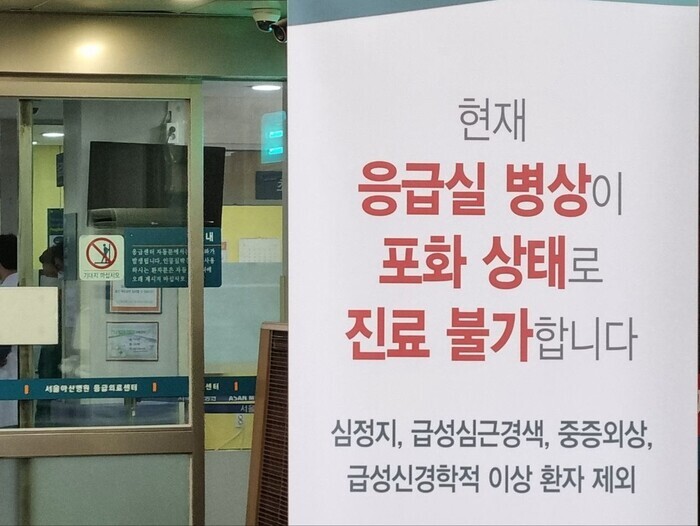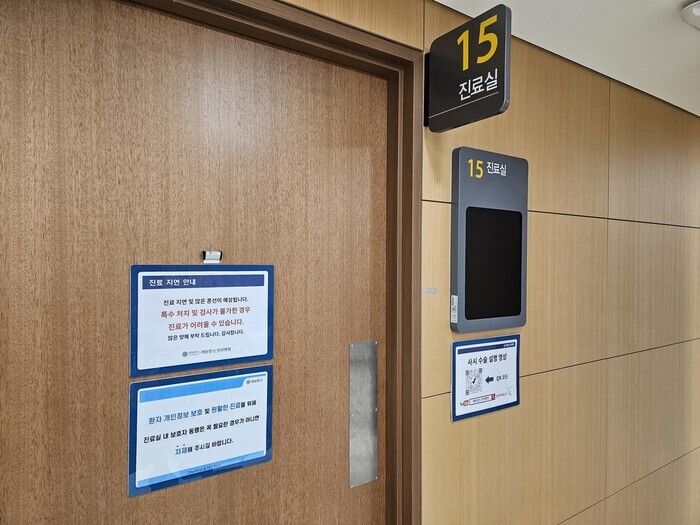hankyoreh
Links to other country sites 다른 나라 사이트 링크
‘My mother could die’: Koreans fear consequences of indefinite delays for surgeries, treatment

“How can they examine her and then say they won’t do the operation?”
Sitting in a chair Tuesday in the first-floor lobby of Samsung Medical Center in Seoul’s Gangnam District, a visitor in their 40s could only tap her feet and wait. The woman, surnamed Park, had traveled from Daegu for an operation to remove a lump from her mother’s spinal cord.
Park’s mother was originally supposed to return to Daegu after undergoing an examination at Samsung Medical Center and making an appointment for an operation. Instead, she was notified by the hospital that day that the operation could not be performed.
“My mother’s spinal cord is paralyzed, and they said that she could end up paralyzed from the waist down if she doesn’t get surgery as soon as possible,” Park explained.
“It’s looking like they won’t be able to perform it at Samsung Medical Center, and now I’m worried our surgery appointment at another hospital [scheduled as a contingency] will also end up canceled,” she said.
Patients and their guardians are facing growing issues as interns and residents resigned en masse resignation on Monday and Tuesday at Seoul’s so-called “big five” hospitals — Seoul National University Hospital, Asan Medical Center, Seoul St. Mary’s Hospital, Severance Hospital (Sinchon), and Samsung Medical Center — to protest the Yoon Suk-yeol administration’s increase in the cap on medical college admissions.
The remaining medical staff have also been left struggling with a heavier workload.
At the entrance to the emergency room at Asan Medical Center in Seoul’s Songpa District, a sign Tuesday morning read, “Emergency room beds are currently full. No examinations.”

The saturation appeared to be due to the emergency room’s inability to accommodate patients due to its reduced medical staff.
A 32-year-old patient surnamed Han, who suffers from a heart condition, was among those who ended up having to go elsewhere.
“I’ve been to the emergency room a lot because of my condition, and I’ve never seen a notice like this before,” they said.
A 46-year-old surnamed Park, who had come up from Masan in South Gyeongsang Province, said, “Yesterday, we arrived at the emergency room at 2:30 pm and had to wait in line for two hours before being seen by a doctor.”
“My mother has pancreatic cancer and could die if they don’t operate soon, but they just keep telling us to wait without letting us know when she can get an operation,” Park said.
At 2:45 pm that day, a notice was sent out on a mobile phone application run by the Ministry of Health and Welfare that provides information on emergency medical treatment options: “At Asan Medical Center, adult patients will not be able to receive simple stitches in the emergency room plastic surgery division, and surgical trauma patients will not be admitted due to a lack of intensive care unit space.”
At Samsung Medical Center, operations not considered absolutely urgent were down by around 30% from their ordinary levels that day. Seoul St. Mary’s Hospital imposed an emergency system for surgery, intensive care, and delivery room space based on the severity of symptoms.
The medical staff still left at the hospitals had their hands full both dealing with the stream of patients while informing others that their operations were being canceled or postponed.
“We’re calling up patients one by one to tell them, ‘There’s a strike going on. Do you absolutely need this surgery or can you delay it?’” said a nurse at Seoul National University Hospital in Seoul’s Jongno District.
“The surgeries in the ward are down by half. Fellows are filling in for the interns and residents, but there are things that aren’t getting covered because of understaffing,” they explained.
“In general, all the departments are trying to cancel operations if possible, so by next week, you have to assume that surgery is not going to be available at all,” they added.
The effects of the disruptions and canceled operations were felt most immediately in departments where services are not a life-or-death matter, including ophthalmology.
Soonchunhyang University Hospital made the decision to cancel some ophthalmology operations or refuse same-day outpatient treatment. At Severance Hospital in Sinchon and other major medical centers, ophthalmology departments sent notices to patients informing them that outpatient treatment would not be available due to the interns’ and residents’ departure.
More and more expectant mothers also received messages telling them that their cesarean sections were being postponed or that analgesic epidural injections would not be available.
Severance Hospital notified mothers that epidurals would be unavailable for births as of Monday due to the lack of interns and residents in the anesthesiology department.
“We don’t have anesthesiology interns and residents, and that means we can’t administer epidurals,” a hospital official explained.
By Yoon Yeon-jeong, staff reporter; Kim Chae-woon, staff reporter; Go Na-rin, staff reporter; Jeong Bong-bi, staff reporter
Please direct questions or comments to [english@hani.co.kr]

Editorial・opinion
![[Column] Tariffs on China: Trump was dumb, Biden dumber [Column] Tariffs on China: Trump was dumb, Biden dumber](https://flexible.img.hani.co.kr/flexible/normal/500/300/imgdb/original/2024/0520/191716191153918.jpg) [Column] Tariffs on China: Trump was dumb, Biden dumber
[Column] Tariffs on China: Trump was dumb, Biden dumber![[Column] What if Seoul took reunification by force off the table? [Column] What if Seoul took reunification by force off the table?](https://flexible.img.hani.co.kr/flexible/normal/500/300/imgdb/original/2024/0520/3017161928630494.jpg) [Column] What if Seoul took reunification by force off the table?
[Column] What if Seoul took reunification by force off the table?- [Editorial] Intensifying US-China rivalry means Seoul must address uncertainty with Beijing sooner than later
- [Column] When ‘fairness’ means hate and violence
- [Editorial] Yoon must stop abusing authority to shield himself from investigation
- [Column] US troop withdrawal from Korea could be the Acheson Line all over
- [Column] How to win back readers who’ve turned to YouTube for news
- [Column] Welcome to the president’s pity party
- [Editorial] Korea must respond firmly to Japan’s attempt to usurp Line
- [Editorial] Transfers of prosecutors investigating Korea’s first lady send chilling message
Most viewed articles
- 1To weigh costs and benefits, Korea must stop treating US troop presence as a sacred cow
- 2Xi, Putin ‘oppose acts of military intimidation’ against N. Korea by US in joint statement
- 3Kim Jong-un wanted to meet with residents of shelled Yeonpyeong Island in South, Moon recalls in mem
- 4Berlin mayor hints at tearing down ‘comfort women’ memorial in city
- 5[Column] What if Seoul took reunification by force off the table?
- 6[Editorial] Transfers of prosecutors investigating Korea’s first lady send chilling message
- 7[Column] Tariffs on China: Trump was dumb, Biden dumber
- 8[Column] US troop withdrawal from Korea could be the Acheson Line all over
- 9[Column] In Germany, Japan is waging a war over its history with Korea
- 10AI is catching up with humans at a ‘shocking’ rate